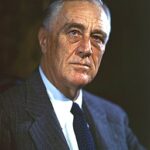President Franklin D. Roosevelt signed Executive Order 9066 on February 19, 1942. This order authorized military commanders to exclude Japanese Americans from the West Coast. The decision came just ten weeks after Pearl Harbor attacked America.
The Executive Order
Roosevelt’s Japanese American internment order targeted over 120,000 people of Japanese ancestry. Two-thirds were American citizens born in the United States. Military officials forced families to abandon homes, businesses, and possessions within days. ⚠️ The government provided no due process or individual hearings before detention.
The Camps
Ten internment camps opened across remote areas in seven states. Families lived in cramped barracks surrounded by barbed wire and guard towers. Camp conditions were harsh, with inadequate medical care and educational facilities. 📊 The average family received just $38 per month for basic necessities.
Legal Challenges
Several Japanese Americans challenged the order in federal courts immediately. The Supreme Court upheld the policy in Korematsu v. United States (1944). Justice Robert Jackson dissented, calling the decision a “loaded weapon” for future tyranny. 💰 The economic losses for internees exceeded $400 million in 1940s dollars.
Impact:
The Japanese American internment created devastating long-term consequences for individuals, families, and American society. The policy violated fundamental constitutional principles and damaged America’s moral authority during World War II.
Personal and Family Destruction
🔥 Internment shattered Japanese American families and communities permanently. Children lost educational opportunities during critical developmental years. Many families never recovered financially from property losses and business closures. Psychological trauma affected internees for decades after their release. Parents struggled with shame and depression in the camps.
Constitutional and Legal Consequences
The Supreme Court’s Korematsu decision remained valid law for 40 years. Legal scholars criticized the ruling as one of the Court’s worst decisions. 📉 Public trust in government protection of civil liberties declined significantly. The precedent threatened other minority groups during future national emergencies.
Economic and Social Impact
Japanese American communities on the West Coast never fully rebuilt. 💰 Property values in former Japanese neighborhoods declined after forced sales. Small businesses owned by Japanese Americans disappeared permanently from many cities. The policy cost taxpayers millions in camp construction and operation expenses.
International Reputation
🌍 Allied nations questioned America’s commitment to democratic values and human rights. Enemy propaganda used internment to discredit American war aims globally. The decision undermined U.S. criticism of Nazi persecution policies in Europe.
